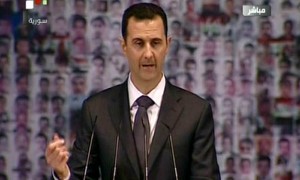 The West believes that Assad�s fall will serve Israel by cutting Syria off from Iran and Hezbollah. But regardless of the outcome, those ties could remain.
The West believes that Assad�s fall will serve Israel by cutting Syria off from Iran and Hezbollah. But regardless of the outcome, those ties could remain.The combat map of the opposition troops in Syria resembles a lace curtain that is falling apart. From the reports of the many militias or the regime�s army, one cannot assemble any picture of the situation that clarifies who is in control and where. Each side has its own story and both sides cite statistics to prove they have achieved their goals: The opposition claims it is in control of two-thirds of the country, while the regime claims that it has the entire country in its control except for �one-third of a town here and a quarter of a town there.�
For example, the opposition reported last week that the town of Al-Shdida in the Al Hasaka governorate in northeastern Syria was under the control of the Islamist group Al-Nusra, which is affiliated with Al-Qaida. Three days later, it was reported that tens of thousands of Syrian citizens had fled the town because of the terrible fighting taking place there. Quarters in the city of Homs that had been under the control of the Free Syrian Army were �liberated� by regime forces, while in Dera�a, which is supposedly under the control of Free Syrian army battalions, the Syrian army continues to arrest people and conduct street battles.
It looks like a military victory is not on the horizon. Iran and Russia have already removed�archives of sensitive documents�out of Damascus and Tartus, which is where the Russian naval base is located, suggesting there is real fear that Bashar al-Assad�s regime may fall. Both countries, along with the opposition leadership, have already admitted there's no alternative to a diplomatic solution.
A meeting is scheduled to take place in Moscow at the end of the month between opposition leader Maaz el-Khatib and regime representatives to�discuss next steps. At the moment, though, such dialogue seems far from reality. The regime�s statement that it was willing to talk with the opposition without prior conditions didn't negate the opposition�s prior condition: that Assad be removed from power before any talks can begin.
Publicly, neither side has blinked yet. Each seems to believe that time is on its side, or at least that it needs more of it to strengthen positions and gain an advantage on the ground. The huge number of people killed in the conflict � between 65,000 and 90,000 � has created no sense of urgency.
While the political opposition and the militias operating on the ground are pondering Syria�s future, Iran and Hezbollah are already sketching the new map of power.
According to a report from journalist Hoda al-Husseini in Asharq Al Awsat, an international Arabic newspaper published in London, Hezbollah has proposed a deal to Syrian Alawite officers that includes protection and sheltering in Lebanon once Assad falls. The deal includes housing and a salary in exchange for aid and advice in warfare, intelligence deployment and the operation of sophisticated weapons in Lebanon.
These deals will be backed by Iran, which, according to various reports, already has 50,000 combat fighters and consultants in Syria and has already established units similar to the Iranian Basij, a volunteer militia. Some of these reports say that General Hassan al-Shatri, who was killed in Syria, allegedly by an Israeli bombardment of Jamraya, was the one responsible for establishing these forces.
�The goal of Iran and Hezbollah is to remove the chance that a political solution in Syria or the fall of Assad will reduce Iranian control over Lebanon and Syria,� a member of the Lebanese opposition in France told Haaretz. �If Assad�s fall is inevitable, then as far as Iran and Hezbollah are concerned, the appropriate replacement is to establish, in Syria, a Shiite military force over any new regime that arises there. Just as Hezbollah controls Lebanon by virtue of its military power, a well-armed and well-trained militia in Syria will be able to impose its own will on any Syrian regime.�
There is nothing new about that idea. Iran, which is having a difficult time winning the cooperation of many of the Arab states, relies on extra-governmental organizations to promote its interests in those states.
For example, Iran supports the Mahdi Army, Muqtada al-Sadr�s group in Iraq, gives money and arms to Shiite groups in Yemen, provides protection to the Shiite minority in Bahrain and, in the past, maintained Hamas.
The Iranian regime collaborates with non-Shiite groups as well, as long as they are willing to cooperate. Sunni militias and groups operating in Syria need financial assistance and a safe route for arms smuggling and Iran could be an important asset to them and any other ethnic group. This will be all the more applicable if Assad�s regime should fall and a new, dangerous opposition in need of�funding and aid from the outside should arise against the current opposition.
The assumption, in the West and in Israel, that Assad�s fall will serve Israel�s interests because it will disconnect Syria from Iran and Hezbollah, is both irrelevant and misguided.
It is irrelevant because Assad�s survival, or fall, does not depend on the West, which, in its apathy, left the Syrian crisis in the hands of Russia and Iran. It is misguided because not even regime changes in Syria guarantee that Syria will cut ties with Iran.
By Haaretz
The Iran Project is not responsible for the content of quoted articles.










